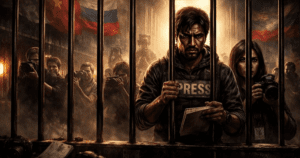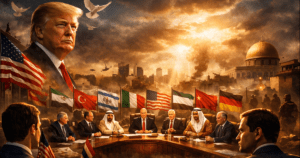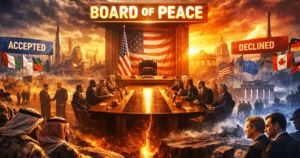by: The Washington Eye
In 1963, political philosopher Hannah Arendt introduced the concept of the “banality of evil” in her landmark book Eichmann in Jerusalem. Arendt, a Jewish intellectual who fled Nazi Germany in the 1930s, had witnessed firsthand the collapse of democratic institutions into fascist machinery. She observed Adolf Eichmann, a chief architect of the Holocaust, not as a deranged monster, but as a disturbingly ordinary bureaucrat who committed horrific acts not out of deep hatred, but through unthinking conformity to a genocidal system.
Arendt’s insight—that unspeakable evil often arises not from monstrous intent, but from ordinary people accepting immoral norms—resonates with haunting clarity today, especially as we witness the deepening humanitarian catastrophe in Gaza.
Bureaucratized Brutality
Since the start of Israel’s military operation in October 2023, over 54,000 Palestinians have been killed in Gaza, including tens of thousands of women and children. Entire neighborhoods have been leveled, medical infrastructure obliterated, and basic necessities like water, electricity, and food remain scarce.
The deaths are not random; they are the calculated results of policies and procedures: targeted bombings, aid restrictions, and military blockades—executed under the banner of national security and counterterrorism. On June 3, Israeli troops opened fire on desperate civilians at an aid distribution site in Rafah, killing 27 people. This was not an isolated incident but the third such event in three days.
Much like the machinery of genocide that Arendt chronicled, the mechanisms of Gaza’s destruction operate through paperwork, authorization, and institutional language—phrases like “collateral damage” and “surgical strikes” serve to mask the visceral truth. Bureaucratic efficiency cloaks human suffering.
International Complicity
Meanwhile, the global response remains disturbingly muted. The United Nations has repeatedly condemned the actions, and while some countries, like France, have taken steps toward recognizing Palestinian statehood, others—including the United States—continue to shield Israel diplomatically. On June 4, 2025, the U.S. vetoed a UN Security Council resolution demanding an immediate and unconditional ceasefire. Fourteen of the fifteen members supported the resolution. The U.S. stood alone.
Justifications echo bureaucratic language: Hamas must be condemned first. Security guarantees must be met. Ceasefires must be “responsible.” In this geopolitical theater, Palestinian lives are weighed not in human terms, but in rhetorical calculus.
This complicity extends beyond governments. Media cycles minimize Palestinian suffering. Corporate partners sidestep accountability. Even academic institutions remain silent, fearing backlash. The normalization of Gaza’s devastation is being written into the institutions of our global order.
The Danger of Normalizing Injustice
Arendt warned that evil becomes most insidious when it is no longer seen as extraordinary. When daily atrocities are digested as “tragic but necessary,” when moral outrage fades into political calculation, when empathy is diluted by legalistic debates—then evil is no longer at the margins of society; it becomes its quiet center.
This is the crisis of our time: not just the bombs and blockades, but the moral anesthesia that allows them to persist.
Children dying of starvation, hospitals bombed, civilians gunned down at food lines—these should shake the conscience of every free society. And yet, the world watches with a mixture of helplessness and indifference. This is not apathy born of ignorance. It is a learned blindness—a coping mechanism of global spectatorship conditioned to watch suffering as content, policy as spectacle.
The danger is not just the destruction of Gaza. It is the erosion of our collective capacity to care, to respond, to resist.
A Call to Moral Responsibility
Arendt’s legacy demands that we resist this erosion. To think critically in the face of mass conformity. To recognize that evil, in its most durable form, hides in routines, procedures, and polite indifference. In Gaza, we are not witnessing a failure of diplomacy—we are witnessing a failure of humanity.
Justice begins with truth-telling. It continues with accountability. And it must end with restoration, not of borders or governments, but of dignity.
We must ask ourselves the very question Arendt demanded of her readers six decades ago: when the machinery of violence is operating in our name—or with our silence—will we have the courage to say no?



















